


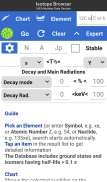
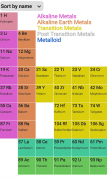

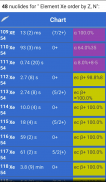
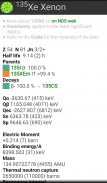

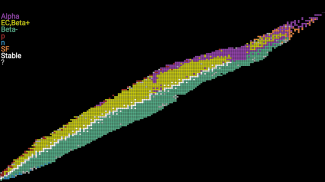
Isotope Browser

Description of Isotope Browser
Isotope Browser is an application developed by the Nuclear Data Section of the International Atomic Energy Agency. This app provides users with detailed properties of over 4,000 nuclides and isomers, making it a valuable resource for those interested in nuclear science. It is available for the Android platform, allowing users to easily download Isotope Browser for their devices.
The app includes a Chart of Nuclides, which features zooming and tapping capabilities to enhance user interaction. This chart allows for easy visualization and navigation of the various nuclides. Additionally, a Periodic Table of Elements is integrated into the app, providing a familiar reference point for users as they explore the properties of different isotopes.
Users can apply filter criteria based on half-life, decay mode, radiation type, and energy. This functionality enables individuals to narrow down their search to specific isotopes of interest. As users navigate through the filtered results, summary data is presented in a scrolling list format, making it convenient to view multiple entries at once.
Each nuclide has its own dedicated details page, which offers comprehensive information, including web links to relevant data sources and further information. This feature ensures that users can access additional resources to deepen their understanding of each nuclide. The app’s design supports an embedded database, allowing for optimal search-and-retrieve performance without requiring a network connection. This offline capability is particularly useful for users who may not always have internet access.
Isotope Browser is aimed at a wide range of users, including students, educators, researchers, and professionals in the nuclear field. The app’s user-friendly interface facilitates easy browsing and searching, making it accessible for individuals with varying levels of expertise in nuclear data.
The Chart of Nuclides not only serves as a visual guide but also allows users to visualize the filtered nuclides directly. By interacting with the chart, users can gain insights into the relationships between different isotopes, enhancing their understanding of nuclear properties. The zooming functionality enables users to focus on specific areas of interest, making it easier to analyze complex data.
In addition to the Chart of Nuclides, the app's filtering options are robust. Users can adjust parameters to find isotopes that meet specific decay modes or radiation types. This precision in searching is beneficial for researchers looking to gather data on particular isotopes or for students studying specific topics related to nuclear science.
The scrolling list of summary data presents essential information in a clear format. Users can quickly scan through entries, helping them locate the nuclides they need without wading through excessive information. This approach streamlines the user experience, making the app efficient for both casual browsing and detailed research.
The detail pages for each nuclide provide a wealth of information, including half-life, decay modes, and other relevant properties. The inclusion of external links allows users to explore data sources and additional materials, fostering a deeper engagement with the subject matter. This feature is particularly advantageous for those who wish to conduct further research or verify the information presented in the app.
Isotope Browser relies on data sourced from the most recent and reliable references, ensuring that users receive accurate and up-to-date information. This commitment to quality data is crucial for professionals and researchers who depend on precise nuclear information for their work.
The app's design emphasizes usability, with intuitive navigation and a clean interface. Users can easily transition between the Chart of Nuclides, the Periodic Table, and the details pages, providing a seamless experience. The logical layout allows users to find what they need quickly, whether they are exploring the app for general knowledge or conducting specific research.
Isotope Browser serves as a critical tool for anyone interested in nuclear science, offering extensive data and resources. Its combination of visual aids, filtering options, and detailed information makes it a comprehensive resource for understanding the properties of nuclides and isomers. The ability to download Isotope Browser on Android devices ensures that users can access this valuable information whenever needed, supporting their educational and professional pursuits in the field of nuclear science.
For more information, you can visit the official website of the International Atomic Energy Agency.
























